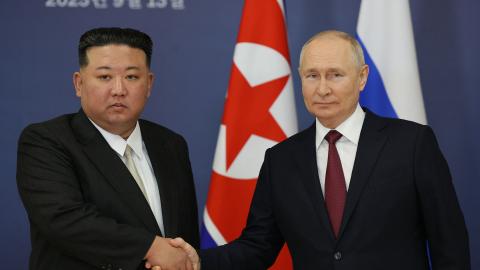A Far Eastern Russian spaceport is an unlikely venue to win the war in Ukraine or tip the balance of power on the Korean peninsula. Yet that is what Vladimir Putin and Kim Jong Un had in mind this week when they pledged to meet each other’s acute security needs.
The heavily armored train that lumbered north across the 11-mile-wide North Korean-Russian border into Primorsky Krai, hundreds of miles past Vladivostok to Vostochny Cosmodrome in the Amur Oblast, showcased two dictators determined to get their way through military dominance.
While the staged theater highlighted potential new military threats, it also lifted the veil on failing military-first strategies that prize guns over butter. The least convincing of all were Putin’s and Kim’s renewed bonds of solidarity.
Putin’s survival and legacy depend on winning a war he recklessly escalated in February of 2022. He met with Kim to enlist him as de facto arms minister, capable of churning out millions of rounds of artillery and rockets that could extend the war in Ukraine.
By threatening to help North Korea pose a more credible nuclear threat in Asia, Putin hopes he can divert American attention exclusively to the Far East. But this is less a carefully calculated plan than an implausible ploy to buy time and see what happens.
Villains have values, too. But this was a transactional encounter at the launch pad for Soyuz rockets. It was not a unified, values-based alliance in which each side believed that each would fight to protect their “anti-imperialist” brothers. No, it was a shabby little deal in which North Korean arms were meant to forestall Russian defeat in Ukraine and provide time to convince Ukraine and its backers to quit fighting. Russian space tech and know-how are intended to boost Kim’s need for surveillance as he continues to field an all-azimuth nuclear arsenal designed to deter attack and coerce concessions.
Other aspects of the relationship may reveal themselves to go even deeper. For instance, should Putin be inclined, Moscow could assist Pyongyang further with a potential effort to field a triad of land-, sea- and air-based nuclear platforms. Kim has made serious strides toward fielding a credible land-based nuclear threat. He also earlier this month launched a converted sea-based nuclear deterrent based on an old Russian submarine design. Kim might think Putin would transfer some modern aircraft, some of which also might be converted to carry nuclear-tipped missiles. That undoubtedly would bolster Pyongyang’s nuclear status.
In promising to make Russia the number one priority of North Korea, Kim certainly made his pitch for Putin’s military support.
Feeling immune from additional sanctions, Kim is ready to turn North Korea into an arsenal for autocracy. Food and fuel could sweeten the relationship, although Kim’s internal problems were carefully kept from his train trek to the Russian Far East.
The Russian Far East is known for its desolate and punishing environment, a perfect backdrop for highlighting the resilience of two revisionist powers. In the alternate universe of strongmen, sovereignty is whatever you can get away with. Their version of reality resembles a rules-based order only because those who govern with an iron fist make up the rules. Law is for weaklings.
Putin’s belief that he is a latter-day Peter the Great who can outlast his opponents in Ukraine and Kim’s notion that North Korea is a great nuclear power that can frighten its neighbors into submission represent narrow, one-dimensional strategies destined to fail. Talk of new rail connections is a reminder of past unfulfilled promises.
Law is not for weaklings. Law is the luxury of civilizations that can maintain peace in the face of malevolent forces. Those forces appeared inflated after the summit in the Russian Far East, but they are unlikely to bend the arc of history toward a new era of territorial wars and successful family dynasties.
China’s top diplomat Wang Yi will soon head to Russia. We can expect superficial support from Beijing because trilateral cooperation gives all three powers leverage over their democratic rivals. Beneath the surface, however, the gaping differences in strategic objectives will be apparent. Even if Xi Jinping insists on privileging political repression over economic reform, China is too big a part of the global economy to neglect its fundamental interests.
So, while the United States and its allies continue to seek more stable economic relations with China, they should further deepen strategic coordination and improve their military capabilities — nationally, bilaterally, and trilaterally with Japan. They also must balance keeping the peace in Asia with robust support to help Ukraine keep making gains against Russian occupation forces. Finally, they should continue investing heavily in long-term technological advantages to grow the economic and military gap between prosperous, democratic allies and revisionist powers over-invested in arms.
By dealing with China as a vital part of a global shifting economy, minding U.S. and allied military capabilities, and keeping a close watch on an evolving Russian-North Korean partnership, the summit in the Far East will, in time, come to represent just another failure on the Moscow-Pyongyang launchpad.















